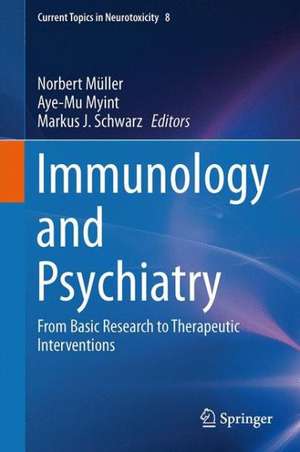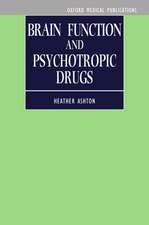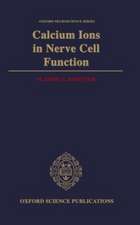Immunology and Psychiatry: From Basic Research to Therapeutic Interventions: Current Topics in Neurotoxicity, cartea 8
Editat de Norbert Müller, Aye-Mu Myint, Markus J. Schwarzen Limba Engleză Hardback – 4 mai 2015
Preț: 956.69 lei
Preț vechi: 1166.69 lei
-18% Nou
Puncte Express: 1435
Preț estimativ în valută:
183.08€ • 190.90$ • 152.16£
183.08€ • 190.90$ • 152.16£
Carte tipărită la comandă
Livrare economică 21 martie-04 aprilie
Preluare comenzi: 021 569.72.76
Specificații
ISBN-13: 9783319136011
ISBN-10: 3319136011
Pagini: 404
Ilustrații: XIV, 408 p. 17 illus., 13 illus. in color.
Dimensiuni: 155 x 235 x 22 mm
Greutate: 0.77 kg
Ediția:2015
Editura: Springer International Publishing
Colecția Springer
Seria Current Topics in Neurotoxicity
Locul publicării:Cham, Switzerland
ISBN-10: 3319136011
Pagini: 404
Ilustrații: XIV, 408 p. 17 illus., 13 illus. in color.
Dimensiuni: 155 x 235 x 22 mm
Greutate: 0.77 kg
Ediția:2015
Editura: Springer International Publishing
Colecția Springer
Seria Current Topics in Neurotoxicity
Locul publicării:Cham, Switzerland
Public țintă
ResearchCuprins
Part I. Basic Science.- 1: Animal models based on immune challenge: the links to brain changes and psychiatric disorders.- 2: The prenatal immune activation model for schizophrenia and the role of stress in puberty.- 3: Rodent models of stress induced depression: the link between stress and immune system related changes.- 4. Experimental Human Endotoxemia, Sickness Behavior and Neuropsychiatric Diseases.- Part II. Translational Medicine.- 5. Mild encephalitis theory of psychiatric disorders.- 6. The role of Infection and autoimmune disorders for schizophrenia and depression: Consequences from a large-scale epidemiological study.- 7. Exposure to microorganisms and adult psychiatric disorders: proofs for causal relationship.- 8. Depression: From activation of immune-inflammatory pathways to oxidative-stress-induced autoimmune responses and neuroprogression.- 9. Immune system related markers changes in childhood neuropsychiatric disorders: cause and consequence.- 10. Cytokines and related metabolic biomarkers in adult neuropsychiatric disorders: possible roles in clinical application.- 11. Immune system changes play a role in the development of the metabolic syndrome in psychiatric disorders.- 12. The activation of microglia in severe neuropsychiatric disorders: Focus on infectious mechanisms and PET imaging.- 13. The role of inflammation in Tourette’s Syndrome.- 14. The role of inflammation in Autism.- 15. The role of inflammation in Alzheimer’s Disease.- Part III: Therapeutic application.- 16. Antidepressants: influence on immune system related parameters.- 17. Cyclooxygenase-2 inhibition in management of depression and schizophrenia.- 18. Poly-unsaturated fatty-acids in management of adult psychiatric disorders.
Recenzii
“The editors and authors have produced an excellent,thought-provoking book. The primary audience includes psychiatrists,researchers in immunology and psychiatry, and anyone interested in theimmunological contributions to psychopathology. … This is an excellent book onan emerging and important area in psychiatry: the role of the immune system.Written and edited by internationally recognized experts, it is a welcome additionto the literature. I highly recommend it.” (Michael Joel Schrift, Doody’s BookReviews, September, 2015)
Notă biografică
After studies of psychology and medicine Dr. Norbert Müller was trained in psychiatry, psychotherapy and neurology at the University Hospital of the Ludwig-Maximilians-University in Munich. He did research in the field of psychoneuroimmunology since 1983, primarily in schizophrenia, affective disorders and Tourette’s syndrome. The research focused on pathophysiological aspects and on therapy with anti-inflammatory compounds. Since 2000 he is Professor of Psychiatry, currently vice-chair of the hospital and department of Psychiatry and Psychotherapy, LMU Munich. He was president of the German Society of Biological Psychiatry and member of the executive committee und treasurer World Federation of Societies of Biological Psychiatry (WFSBP), since 2006 he was chair of the section "Immunology in Psychiatry" of the World Psychiatric Association (WPA). He won several honours and scientific awards including the Emil-Kraepelin Research Award.
Dr. Aye Mu Myint is a Medical Doctor and obtained her Ph.D. in Neuroscience from the University of Maasrticht, The Netherlands and has done Habilitation in Experimental Psychiatry at Magdeburg University, Germany. She is working as visiting scientist at Ludwig-Maximillian University Munich, Germany since 2007 and as well as senior research scientist at Advanced Practical Diagnostics bvba (apDia), Belgium since 2006. She is also an honorary assistant professor at the School for Mental Health and Neuroscience from Maastricht University. In 2003, she proposed the “neurodegeneration” hypothesis explaining the neurotoxic changes induced through the involvement of immune system imbalance and imbalance of the kynurenine metabolites beyond the activity of tryptophan pathway. She is one of the leading scientists in the field of neuroscience and psychiatry, and is working on major psychiatric disorders, depression-dementia link, psychoneuroimmunology, kynurenine pathway, and related neuroendocrinology in clinical settings as well as animal and in vitro models of depression, schizophrenia, and neurodegenerative disease. She is also involved in antibodies and immunoassay developments through EU consortia. Outside the EU consortium, she has collaborations with several universities including the University of New South Wales, Australia, and the Universities of Chicago, Illinois, and John Hopkins of the United States.
Markus Schwarz studied Medicine in Munich from 1990 to 1996. After finishing his dissertation on autoimmune mechanisms in schizophrenia, he started his research career and received his habilitation (venia legendi) in Experimental Psychiatry in 2005. From 2004 to 2012 he was head of the laboratory section “PsychoNeuroImmunology and Therapeutic Drug Monitoring” at the Psychiatric Hospital of Munich University. Since 2012 he is head of the research group on Neurobiochemistry at the Institute for Laboratory Medicine of Munich University. His main research interests are the impact of the two main metabolism pathways of tryptophan (serotonin and kynurenine) in psychiatric disorders, immunological investigations to identify a distinct subgroup of schizophrenia with immune-related pathogenesis, basic psychoneuroimmunologic research on the crosstalk between neurotransmitter and cytokine system and role of therapeutic drug monitoring for enhancing efficacy and safety in psychopharmacotherapy. He published more than 130 research articles in international peer reviewed journals.
Dr. Aye Mu Myint is a Medical Doctor and obtained her Ph.D. in Neuroscience from the University of Maasrticht, The Netherlands and has done Habilitation in Experimental Psychiatry at Magdeburg University, Germany. She is working as visiting scientist at Ludwig-Maximillian University Munich, Germany since 2007 and as well as senior research scientist at Advanced Practical Diagnostics bvba (apDia), Belgium since 2006. She is also an honorary assistant professor at the School for Mental Health and Neuroscience from Maastricht University. In 2003, she proposed the “neurodegeneration” hypothesis explaining the neurotoxic changes induced through the involvement of immune system imbalance and imbalance of the kynurenine metabolites beyond the activity of tryptophan pathway. She is one of the leading scientists in the field of neuroscience and psychiatry, and is working on major psychiatric disorders, depression-dementia link, psychoneuroimmunology, kynurenine pathway, and related neuroendocrinology in clinical settings as well as animal and in vitro models of depression, schizophrenia, and neurodegenerative disease. She is also involved in antibodies and immunoassay developments through EU consortia. Outside the EU consortium, she has collaborations with several universities including the University of New South Wales, Australia, and the Universities of Chicago, Illinois, and John Hopkins of the United States.
Markus Schwarz studied Medicine in Munich from 1990 to 1996. After finishing his dissertation on autoimmune mechanisms in schizophrenia, he started his research career and received his habilitation (venia legendi) in Experimental Psychiatry in 2005. From 2004 to 2012 he was head of the laboratory section “PsychoNeuroImmunology and Therapeutic Drug Monitoring” at the Psychiatric Hospital of Munich University. Since 2012 he is head of the research group on Neurobiochemistry at the Institute for Laboratory Medicine of Munich University. His main research interests are the impact of the two main metabolism pathways of tryptophan (serotonin and kynurenine) in psychiatric disorders, immunological investigations to identify a distinct subgroup of schizophrenia with immune-related pathogenesis, basic psychoneuroimmunologic research on the crosstalk between neurotransmitter and cytokine system and role of therapeutic drug monitoring for enhancing efficacy and safety in psychopharmacotherapy. He published more than 130 research articles in international peer reviewed journals.
Textul de pe ultima copertă
Psychiatric disorders are one of the most dramatic burdens for humankind. The role of immune dysfunction in the pathophysiology of these disorders has emerged during the last years, because there has been tremendous progress in psychoneuroimmunological research. Many results are presented here by pioneers in the field. The book addresses various effects of the immune system on the pathophysiology and course of psychiatric disorders and highlights the possible future impact on treatment decisions of various psychiatric disorders, including schizophrenia and depression. The contributions cover the role of in utero immune challenges on the development of schizophrenia, the role of infections, and autoimmune diseases and mild immune activation in the development of depression and schizophrenia, the influence of immune responses in other disorders such as Tourette's, Alzheimer's, and OCD, the connections between mental and physical pain as well as between anti-inflammatory and antipsychotic drugs.
Caracteristici
Presents research on the link between the immune system and psychiatric disorders Covers basic, translational, and clinical research Looks at many disorders including schizophrenia, depression, bipolar disorder, Tourette's, OCD, and Alzheimer's




















